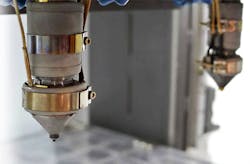Acquisition Adds New AM Option for 3D Systems
Additive-manufacturing group 3D Systems is buying Titan Additive LLC (Titan Robotics), a developer of large-format, industrial 3D printing systems – notably pellet-based, polymer extrusion 3DP technology. Terms of the acquisition were not announced.
3D Systems develops production processes for additive manufacturing, as well as programming and simulations software, and it develops and supplies raw materials for those operations, including wax used to produce investment casting patterns.
The group’s selective laser sintering (SLS) technology produces finished parts, and its stereolithography (SLA) is used to produce tooling for carbon-fiber forms.
The new acquisition will expand the scope of 3D Systems polymer additive-manufacturing technologies, it reported, for new applications in markets that will include sand casting, as well as tooling, jigs and fixtures, and as an alternative to injection molding.
Pellet-based, polymer extrusion is an extension of fused-deposition modeling (FDM) additive manufacturing that incorporates a system for extruding plastic resin, rather than delivering the material via filament. This reportedly addresses some problems involved with large-format 3D printing, speeding up print times and reducing production cost.
For sand casting foundries, pellet-based polymer 3D printing is used to produce tooling, including patterns and core boxes. The Titan Robotics system is capable of large build volumes, which shortens cycle times in pattern and core box production, reducing costs by up 10X compared to printing with traditional plastic filament feedstocks, it reports.
Also, Titan is reportedly the only manufacturer offering hybrid tool head configurations, coordinating the pellet extrusion system and spindle for milling tool. The combination makes an individual machine capable of additive and subtractive manufacturing, so that a 3DP part can be completed with a smooth surface.
This hybrid system is configurable for various applications, and can produce metal parts using heated build platforms and chambers from 30x30x45 in. up to 50x50x72 in., with print speeds up to 30,000 mm per minute.
“With the addition of Titan Robotics’ unique extrusion technology, we will be able to address our customers’ need for large build volumes, superior performance, and improved productivity at a significantly lower cost,” stated president and CEO Dr. Jeffrey Graves. “Through the innovative modular approach of their printers, and the ability to use both pellet and filament product forms in an open architecture with widely available production polymer systems, we believe the adoption rate of industrial 3D printing will continue to accelerate.”
